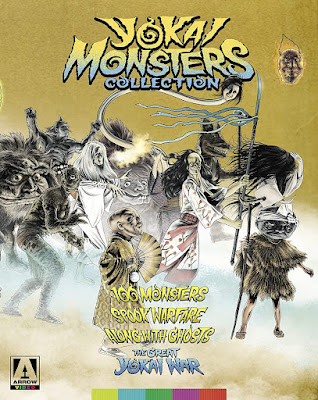After unleashing the Daimajin on collectors with their three-film box set only a handful of months ago, Arrow Video continue their Daiei run with the Yokai Monsters Collection. Complete with the original three film run of the Yokai Monster trilogy and auteur director Takashi Miike’s love letter to those films, this collection brings together four films that were not regularly available (if at all) to Western audiences. Whether you’re a fan of supernatural monster flicks, strange genre-bending slices of cinema, or Japanese film history, it’s hard to go wrong with this boxset as a collector.
The mileage that one gets from the films included in Yokai
Monsters depends on their ability to roll with the shifting genres and a
sense of artifice within their stories. This review covers the second film in
the series, Spook Warfare, but stay tuned for more reviews for the rest
of the series.
SPOOK WARFARE (1968)
Director: Yoshiyuki Kuroda
Notable Cast: Yoshihiko Aoyama, Akane Kawasaki,
Takashi Kanda, Hideki Hanamura, Chikara Hashimoto, Hiromi Inoue, Mari Kanda,
Gen Kimura
Although the first film in the Yokai Monsters series,
100 Monsters, told its story in full, that has never stopped a franchise
from kicking forward. The first sequel, Spook Warfare, aims to take the
same basic concept, people who accidentally unleash some classic mythological
Japanese spirit monsters, and gives it a tonal and structural overhaul. The
results are fascinatingly more entertaining as a whole and it easily fulfills
the promises made with the title.
After the film opens with two guys accidentally unleashing a
powerful bird-like monster who quickly kills and assumes the body of a Japanese
lord, another yokai, a water imp, is ousted from his water home on the Lord’s
property. This sets up the titular battle between spirits when the water imp
gathers the other yokai from around the area to help battle the evil intruder
and help save the humans and his home.
This second entry is now helmed by Yoshiyuki Kuroda,
director of Lone Wolf and Cub: White Heaven in Hell, although I’m not
sure you would know that just from the look and feel of the two films, but the
change of director does show. The biggest difference between films is that
while there is still that atmospheric feel of its shadowy sets and it leans
into its surrealistic spooks, this one is far more comedic than its predecessor
and focuses on the yokai rather than the human characters as the main
protagonists. Considering most of the issues that had arisen from the
seriousness and focus on the human plot of the predecessor, these changes come
as a welcome maneuver for most viewers. All these yokai films are entertaining,
but this one is the most entertaining.
The change in tone and focus on the yokai monsters is that Spook
Warfare gets to showcase a slew of different creatures and deliver tons of
goofy spectacle. As with the first film, the effects are a rather acquired
taste as the use of costumes, layered visuals effects, and in camera tricks to
fool the audience all feature a level of artifice that might be too much.
However, for a 1968 flick, so much of that material is ambitious. Particularly
when the yokai are now the main focus of the film. It may seem silly by today’s
standards, but the effect is perfectly in tune with the tone and feeling of the
film.
Naturally, the focus on the hodge podge group of outcasts
trying to thwart off a powerful intruder is not wholly original, but Spook
Warfare does an admirable job at making the audience feel for the spirits
and their plight. The fun quips and relationships between the key members of
the group is silly and lighthearted so that when they find themselves needing
the help of the human characters (which are very thin as characters and
plotting, for the record) the escalating use of effects and the threat of
consequence builds some decent tension. Not that it was a question whether they
would succeed but seeing them figure out how to defeat the intruder was the
most entertaining part. I never thought I would be cheering for a relatively
annoying water imp, but here we are.
Spook Warfare is not the loftiest of Japanese cinema
nor does it even contain some of the more interesting layers that the first one
did, but that’s not the point. This film is far more aligned with delivering
its enjoyable characters, their relationships with one another, and adding in
goofy spectacle in full. If anything, it’s hard not to enjoy this one for
outlandishness of it all.




No comments:
Post a Comment